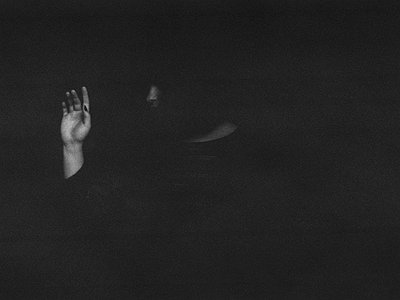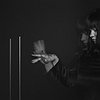Part 2
Could you take us through a day in your life, from a possible morning routine through to your work? Do you have a fixed schedule? How do music and other aspects of your life feed back into each other - do you separate them or instead try to make them blend seamlessly?
The first half of my day I improvise and practice on my theremin and sometimes I record either for myself or for others. I have a pretty fixed schedule on that because I then pick my son up from kindergarten at 3pm. I sometimes practice again after he sleeps if I have a concert coming up, but most of the time I will be too tired in the evening. So, life and music are pretty separate for me.
Could you describe your creative process on the basis of a piece or album that's particularly dear to you, please? Where did the ideas come from, how were they transformed in your mind, what did you start with and how do you refine these beginnings into the finished work of art?
Since the theremin is played in a rather unique way, I came up with my own graphic notation. Most songs for my latest album started off as a pattern which I then played and recorded with help from my DL4.
I then recorded a lot of improvisations around that and later worked on the ideas in Logic. The hardest thing is deciding when you have a finished track. I don't really know when that point has been reached since if it weren't for others telling me it's done I would still be working on it.
There are many descriptions of the ideal state of mind for being creative. What is it like for you? What supports this ideal state of mind and what are distractions? Are there strategies to enter into this state more easily?
For me, it is isolating myself and just improvising. I like being able to just go and start and have everything at the ready. Sometimes by the
time I have set everything up, I have no interest in playing anymore. But if I can just go and play, I can get in there and lose all sense of time. I also like having everything tidy. If things are a mess I get distracted by that and have to tidy up, it is a curse I live with.
How is playing live and writing music in the studio connected? What do you achieve and draw from each experience personally? How do you see the relationship between improvisation and composition in this regard?
I like to improvise when I perform live. Because of that, my songs are constantly changing and then it gets further and further away from what was recorded in the beginning. I really dislike playing a perfect replica of the recordings each time, and on the theremin it's just near impossible. Looping adds extra stress on being perfect so I have given up on the idea of perfection. I used to just put my hands in the air and start on any note that came first, but once I started singing also, I needed to decide on a starting note so I could sing in the range I was playing. I embrace finding something new each time and it makes playing never boring. So, to me, improvisation is very connected to composing.
How do you see the relationship between the 'sound' aspects of music and the 'composition' aspects? How do you work with sound and timbre to meet certain production ideas and in which way can certain sounds already take on compositional qualities?
Sometimes a sound is nice on its own and refuses to be a proper song. I think when you can begin to see a collage of sounds coming together in your head, that’s when it starts to become a composition to me. But it can also be that one sound can be enough as it is and doesn't have to become more than that.
Our sense of hearing shares intriguing connections to other senses. From your experience, what are some of the most inspiring overlaps between different senses - and what do they tell us about the way our senses work? What happens to sound at its outermost borders?
For me the theremin is very visual, I am always very aware of my body when I play and I like to watch things while I play, like movies, video art and music videos. Playing the theremin feels almost like you can touch and dance the music in the air. In a way, sound can be heard with the eyes and your entire body, too.
Art can be a purpose in its own right, but it can also directly feed back into everyday life, take on a social and political role and lead to more engagement. Can you describe your approach to art and being an artist?
My approach to art is more that of an explorer finding exciting sounds and creating a peculiar sound spaces.
It is remarkable, in a way, that we have arrived in the 21st century with the basic concept of music still intact. Do you have a vision of music, an idea of what music could be beyond its current form?
Music is becoming more and more visual and I think it is constantly evolving and expanding. The shape of my music is very dynamic and I think music can be anything you want it to be. There is so much to explore.






